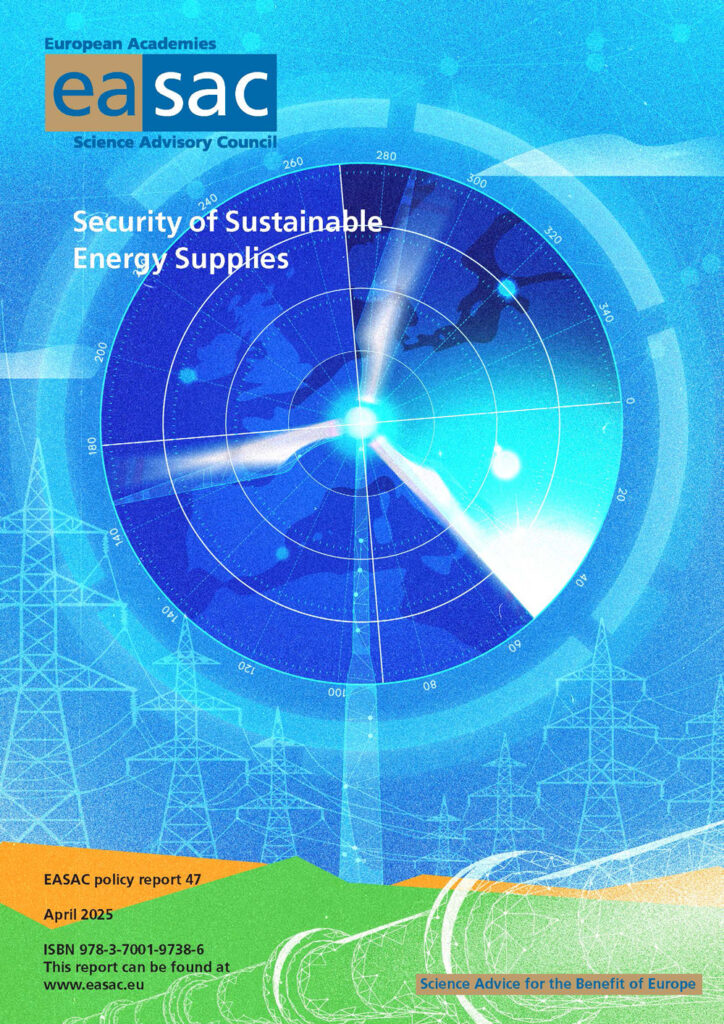“There is no security without energy security.” This is how Dr William Gillett, Director of the EASAC Energy Programme, summarises the report ‘Security of Sustainable Energy Supplies’. Written by experts from Europe’s national science academies, it is presented today. Europe’s greatest insecurity stems from its dependence on imported fossil fuels, mainly oil and gas. This dependency exposes the continent to geopolitical blackmail and makes it economically vulnerable. Only a well-managed transition to sustainable domestic energy and innovative technologies made in Europe can offer a secure and prosperous future.
 Growing geopolitical tensions combined with high dependencies on imported fuels, raw materials and technologies, are an increasing threat to European energy security. The weaponising of energy by autocratic regimes through trade disruptions, physical attacks on infrastructure, and growing numbers of cyber-attacks are increasing not only the risk of interruptions to Europe’s energy supplies but also energy prices. High and volatile energy prices are reducing investor confidence, jeopardising the competitiveness of European industries, and driving millions of vulnerable European households into energy poverty.
Growing geopolitical tensions combined with high dependencies on imported fuels, raw materials and technologies, are an increasing threat to European energy security. The weaponising of energy by autocratic regimes through trade disruptions, physical attacks on infrastructure, and growing numbers of cyber-attacks are increasing not only the risk of interruptions to Europe’s energy supplies but also energy prices. High and volatile energy prices are reducing investor confidence, jeopardising the competitiveness of European industries, and driving millions of vulnerable European households into energy poverty.
Respond to the threat: transition to energy made in Europe
Russia’s attack on Ukraine is funded by exports of fossil fuels, so Europe must stop buying Russian energy. Since 2022, the EU has done a lot to drive this process forward by diversifying its gas supplies and increasing imports of liquefied natural gas (LNG). However, it is particularly important not to shift import dependence from Russian gas to import dependence on LNG from another third country, such as the USA, with all the associated risks.
The report emphasises the urgent need to address the growing threats to energy security and explains how this can be done by accelerating the transition to sustainable energy. “The Green Deal, followed by the recent Clean Industrial Deal, are Europe’s best weapons in the fight to protect its sovereignty. Energy produced by wind and solar does not have to be imported,” emphasises Prof. Paula Kivimaa from Finland, Co-Chair of the EASAC working group. “Every investment in sustainable energy is an investment in our security. In contrast, every euro we spend on energy imports is a euro lost from our defence capability.”
The scientists’ key recommendations:
- Energy efficiency and a circular economy reduce demand, make infrastructure more resilient and increase the availability of raw materials.
- Moving away from fossil fuels and towards sustainable energy, including renewable hydrogen for industry, reduces dangerous dependencies as well as the costs of climate-related disruption and health.
- Decentralised energy systems strengthen local communities and businesses. They also increase resilience to sabotage and climate impact.
- The expansion of European production of key sustainable energy technologies and systems – such as solar cells, wind turbines and batteries – not only increases security, but also contributes to domestic value creation and stimulates economic growth.
Cyber technology
The report calls on the EU to strengthen cyber security in the energy sector, and to require that cyber risk assessments are carried out at both operational and administrative levels. The EU Cyber Solidarity Act and the Cyber Resilience Act are steps in the right direction. However, according to the authors, their effective implementation with cyber-secure digitalisation of energy systems will be crucial.
New thinking on strategic resources
The scientists see a need for partnerships along the supply chains for key energy technologies and raw materials. The transition away from fossil fuels will lead to massive increases in the electrification of buildings, industry and transport, and this will inevitably require major increases in renewable energy supplies, and in the deployment of electrical end-use technologies. Europe must therefore secure reliable supplies of critical raw materials including lithium, cobalt and the rare earths that are used in the manufacture of these technologies.
Equally important are investments in electricity infrastructure and grid flexibility, through storage, interconnectors and demand response with time dependent tariffs. Coupling between the electricity and heating sectors, together with market integration, will help to reduce the overall investment costs of the energy transition as well as the costs and security of future energy supplies.
Prof Claire Dupont, Co-Chair of the EASAC Working Group, demands: “We need to move away from focussing on fuel imports and think more holistically about the energy system. This requires not only technology and raw materials, but very importantly also acceptance by citizens and communities. They must be engaged, and they must benefit economically, much more in the future.”
The report was written by 27 scientists from all over Europe who were nominated by their national science academies. Their aim is to support European decision-makers with facts, analyses and recommendations for action.
Contacts:
Dr William Gillett
EASAC Energy Programme Director
william.gillett@easac.eu
Prof. Paula Kivimaa
Co-Chair EASAC Working Group
paula.kivimaa@syke.fi
Prof. Claire Dupont
Co-Chair EASAC Working Group
claire.dupont@ugent.be
For general enquiries
Sabine Froning
EASAC Communications Adviser
Sabine.froning@easac.eu
+4915208727000
About the European Academies’ Science Advisory Council (EASAC)
EASAC is formed by the national science academies of the EU Member States, Norway, Switzerland and United Kingdom, to collaborate in giving advice to European policymakers. EASAC provides a means for the collective voice of European science to be heard. Through EASAC, the academies work together to provide independent, expert, evidence-based advice about the scientific aspects of European policies to those who make or influence policy within the European institutions.